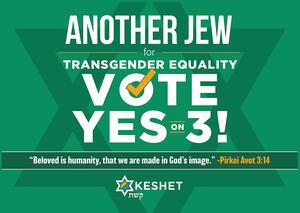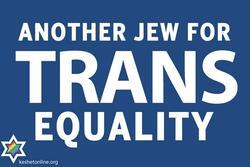In Praise of the Political Lapel Pin
Tuesday, November 6th, 2018, was a dramatic and eventful day in the United States. Our hugely anticipated midterm elections finally arrived, the Democratic party regained control of the House of Representatives, and a number of exciting new candidates won Congressional seats. Here in Massachusetts, we had our own set of hard-fought races and achieved the thrilling milestone of sending Ayanna Pressley, the first woman of color to represent our state, to Capitol Hill. But now, two months after the election, I find myself reflecting on something that DIDN’T happen.
If you live in Massachusetts, you likely know that a ballot initiative aimed at reversing protections for the transgender community in public accommodations failed. We voted NOT to take away trans folks’ rights. The ballot initiative failed in large part because of an incredible grassroots effort to educate Massachusetts residents about the bill and garner their support in defeating it. I had the honor of playing a small role in that effort, participating in canvassing and other activities organized by Freedom MA, Keshet, and other organizations. Throughout the campaign, I wore a lapel pin on my jacket. It was big, bright green, and read “Another Jew for Transgender Equality, Vote Yes on 3.” I figured I would wear the pin until the election. I was proud to show my support for the campaign to uphold rights for the trans community, and while I was hopeful that the pin was big and bright enough to get some attention and trigger conversations, I had no idea how much of a response it would actually garner.
Leading up to the election, a number of people asked me about the pin. When I explained the ballot initiative and the importance of voting in response, some nodded politely and moved the conversation to other topics. Others who were unfamiliar with the Yes on 3 campaign asked more questions, and I am hopeful that my discussions with them helped drum up some more support on Election Day. There were some fun interactions, such as people passing by and yelling, “I like your pin!” and a vendor I know near my workplace commenting, “You’re FOR everyone, aren’t you?” On Election Day, I proudly went to my polling place with my pin prominently displayed, walked up to the entrance… and was told to remove it because I couldn’t wear it inside. Sigh. But once I left, I put the pin back on, figuring I wasn’t ready to let it go until the election was over, the votes were counted, and we knew that rights for all folks, regardless of gender identity, had been upheld. Thankfully, by the time I went to bed that night, we knew just that.
The next morning, in my rush to get myself and my kids out the door, I threw my jacket on without thinking, pin still attached. This was the case the morning after that, and the next few mornings, and... you get the idea. About a week after the election, I went into a CVS to buy a pack of gum, and the person behind the counter commented on the pin, asking if I had been involved with Freedom MA and the canvassing effort. We chatted for a while and as I was about to leave with my gum, my new friend behind the counter at CVS thanked me for supporting them and everyone else in the trans community. It was a really lovely and totally unexpected moment.
I was immediately reminded of another moment, one that happened at a rally in Boston against the Muslim travel ban in January 2017. My dear friend held a sign that read, “Another Jew Standing for our Muslim Brothers and Sisters.” As we stood in the crowd gathered in Copley Square, a woman reached out to my friend and tearfully thanked her for her support. The woman cried, my friend cried, I cried, and everyone hugged. It was a moment that felt rich with connection between strangers, similar to what I experienced at CVS. To be clear, that experience wasn’t so much about the gratitude expressed, although that was lovely, but about the profound nature of what happens when different communities show up for each other, and take on each other’s causes as their own.
I left CVS and decided that maybe I would wear the pin for a little longer, through the rest of 2018. Why not continue to show my support? If it was meaningful to one person, maybe it would be meaningful to others.
As it turns out, the pin continued to spark conversations, and I am glad I continued to wear it. While I want my advocacy work to involve a lot more than wearing a pin or sharing a post, the recognition my button received gave me a new appreciation for the value of wearing my feelings on my sleeve, or in this case, on my lapel. The public backing of a cause I cared about deeply allowed for interactions and discussions that were spontaneous, heartfelt, and often surprising. As our country becomes more divided, and our government more divisive, showing solidarity with communities that are not my own feels imperative. It seems to me that the solutions to the divisions we face are in the relationships we forge and the bridges that we build. I hadn’t anticipated that one small pin would be the pillar of a newly constructed bridge.







